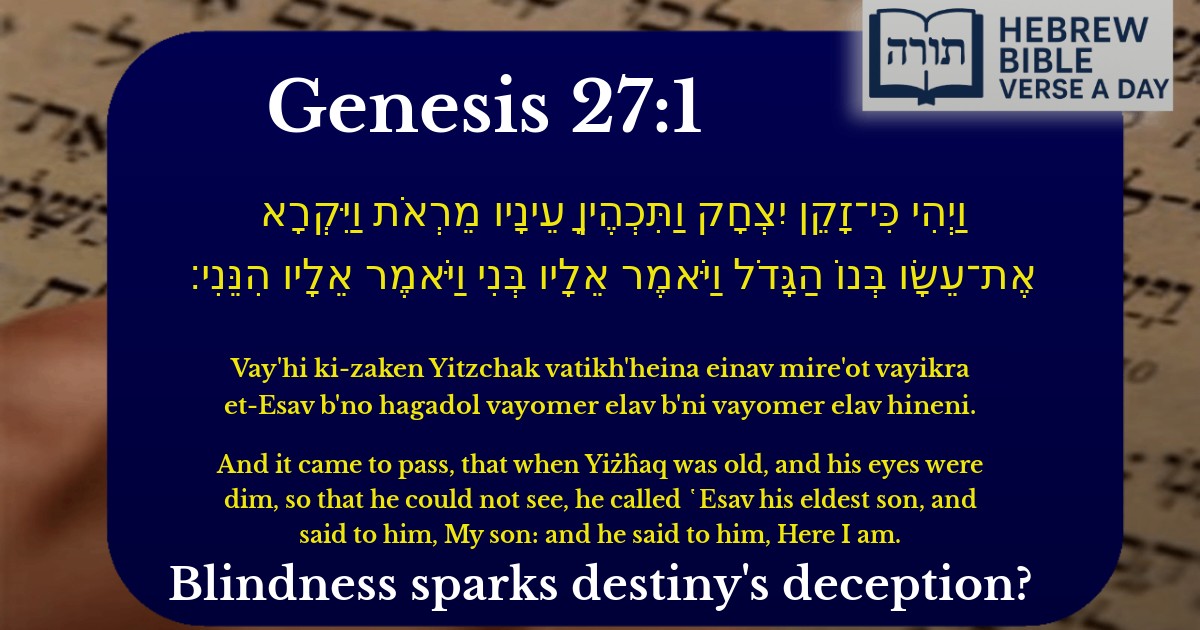Join Our Newsletter To Be Informed When New Videos Are Posted
Join the thousands of fellow Studends who rely on our videos to learn how to read the bible in Hebrew for free!
Hebrew Text
וַיְהִי כִּי־זָקֵן יִצְחָק וַתִּכְהֶיןָ עֵינָיו מֵרְאֹת וַיִּקְרָא אֶת־עֵשָׂו בְּנוֹ הַגָּדֹל וַיֹּאמֶר אֵלָיו בְּנִי וַיֹּאמֶר אֵלָיו הִנֵּנִי׃
English Translation
And it came to pass, that when Yiżĥaq was old, and his eyes were dim, so that he could not see, he called ῾Esav his eldest son, and said to him, My son: and he said to him, Here I am.
Transliteration
Vay'hi ki-zaken Yitzchak vatikh'heina einav mire'ot vayikra et-Esav b'no hagadol vayomer elav b'ni vayomer elav hineni.
Hebrew Leining Text
וַֽיְהִי֙ כִּֽי־זָקֵ֣ן יִצְחָ֔ק וַתִּכְהֶ֥יןָ עֵינָ֖יו מֵרְאֹ֑ת וַיִּקְרָ֞א אֶת־עֵשָׂ֣ו <b>׀</b> בְּנ֣וֹ הַגָּדֹ֗ל וַיֹּ֤אמֶר אֵלָיו֙ בְּנִ֔י וַיֹּ֥אמֶר אֵלָ֖יו הִנֵּֽנִי׃
וַֽיְהִי֙ כִּֽי־זָקֵ֣ן יִצְחָ֔ק וַתִּכְהֶ֥יןָ עֵינָ֖יו מֵרְאֹ֑ת וַיִּקְרָ֞א אֶת־עֵשָׂ֣ו ׀ בְּנ֣וֹ הַגָּדֹ֗ל וַיֹּ֤אמֶר אֵלָיו֙ בְּנִ֔י וַיֹּ֥אמֶר אֵלָ֖יו הִנֵּֽנִי׃
🎵 Listen to leining
Parasha Commentary
📚 Talmud Citations
This verse is quoted in the Talmud.
📖 Megillah 28a
The verse is referenced in a discussion about the aging of righteous individuals and the dimming of Isaac's eyes.
📖 Chullin 60b
The verse is cited in a discussion about the reasons for Isaac's blindness, linking it to the smoke from Esau's sacrifices to idols.


The Dimming of Yitzchak's Eyes
The verse states that Yitzchak's eyes "were dim, so that he could not see." Rashi (Bereshit 27:1) explains that this blindness resulted from three causes:
Calling Esav "His Eldest Son"
The Torah emphasizes that Yitzchak called Esav "his eldest son." The Kli Yakar (Bereshit 27:1) notes that this phrasing indicates Yitzchak's intention to give the firstborn blessings to Esav, despite Yaakov having purchased the birthright. This demonstrates Yitzchak's special affection for Esav, as explained by Ramban (Bereshit 25:28).
The Exchange of "My Son" and "Here I Am"
The simple dialogue where Yitzchak says "My son" and Esav responds "Here I am" carries deeper meaning. The Sforno (Bereshit 27:1) explains that Yitzchak's address showed paternal love, while Esav's response demonstrated his eagerness to receive the blessings. The Malbim adds that this exchange reveals Esav's hypocrisy, as he presented himself as dutiful while concealing his true nature.
Divine Providence in Yitzchak's Blindness
The Or HaChaim (Bereshit 27:1) teaches that Yitzchak's blindness was part of Hashem's plan to ensure the blessings would go to Yaakov. Though Yitzchak intended to bless Esav, his physical limitation became the means through which the proper spiritual order was maintained, as Yaakov was the more righteous son destined to continue the covenant.